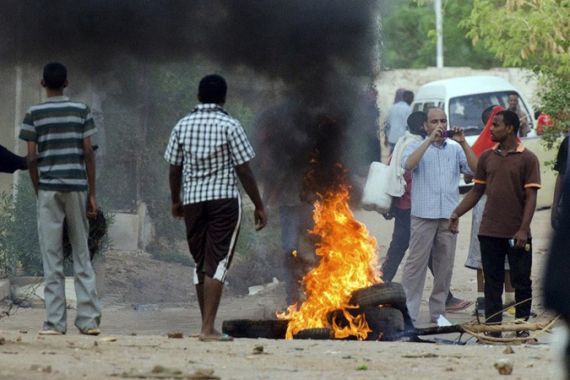Sudan says no retreat on cuts despite protest
Finance minister says Sudan is pushing ahead with austerity measures “no matter what”, despite ongoing unrest.

Sudan’s finance minister has said the government will stick to its decision to cut fuel subsidies, despite more than a week of anti-austerity protests in Khartoum and elsewhere.
“We will not retreat from our policy to remove the subsidy, whatever happens,” Ali Mahmud al-Rasul said on Monday.
“If the price of oil goes higher in the international market, we will increase it in Sudan.”
Demonstrations have spread since June 18, when President Omar al-Bashir announced austerity measures which included tax hikes and an end to cheap fuel.
He also sacked all nine of his presidential advisers, the official Sudan News Agency reported, a group which includes members of the ruling party and other political factions.
Meanwhile, demonstrations against high prices and Bashir’s 23-year rule continued for an 11th day on Tuesday, witnesses said.
Unrest continues to spread
The protests began with student-led demonstrations outside the University of Khartoum on June 16. But they later broadened to include a wider range of Sudanese in locations throughout the capital, as well as in several other parts of the country.
In Gedaref, part of the poverty-stricken eastern region, about 200 people protesting at the local market were dispersed by riot police firing tear gas and wielding batons, they said. Protesters later regrouped and set a fire inside the ruling party’s office near the market.
“I saw some documents and furniture and a part of the building … burned,” one resident told AFP.
Demonstrators also stoned the car of the local government head, witnesses said, adding the official was not hurt.
About 100 people emerged on Monday night from the Khartoum headquarters of a main opposition party, the Popular Congress. In what has become a familiar ritual, they burnt tyres and called for the overthrow of the regime, and police responded with tear gas.
The cost of petrol at the pump has roughly doubled since last week under the new policy, adding to an inflation rate which has risen every month and hit 30.4 per cent in May.
Lost oil revenue
Sudan has lost billions of dollars in oil receipts since South Sudan gained independence last July, taking with it about 75 per cent of Sudanese crude production. The north has been left struggling for revenue, plagued by inflation, and with a severe shortage of dollars to pay for imports.
The landlocked South depended on the north’s pipeline and port to export its crude, but Khartoum and Juba could not agree on how much South Sudan should pay to use the infrastructure.
Sudan’s already depleted oil revenues shrank by a further 20 per cent after its main Heglig oil field was damaged and shut down in fighting with invading South Sudanese troops in April, international economists have estimated.
Even before the easing of fuel subsidies, the cost of basic consumer goods had doubled over the past year.
Bashir, an army officer who seized power in 1989, called the protests small and not comparable to the “Arab Spring” uprisings against regional strongmen over the past year. He blamed anti-government protests on the work of “a few agitators” in a speech late Sunday.
But a demonstrator told AFP the current unrest is unprecedented. “Right now, this is first time since 1989 we have these protests in most cities,” he said, asking not to be identified by name.
There have been calls on social networks for a mass nationwide protest on June 29.